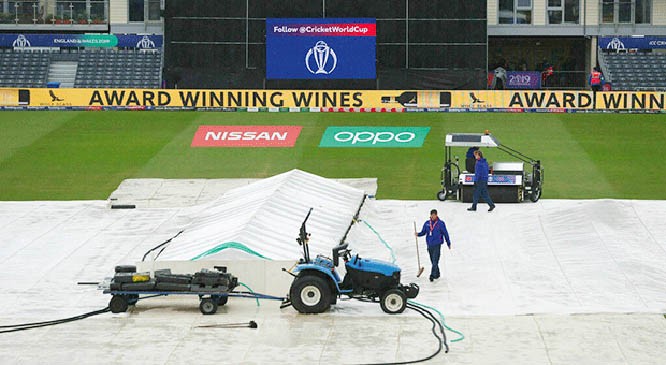
A sports journalist turns traveller while covering the Cricket World Cup

It was 7 in the morning, and the Great Western Railways’ train from London Paddington to Bristol was on time. We hopped in, hoping that the journey wouldn’t be an exercise in futility. The forecast didn’t look good for Pakistan’s World Cup game against Sri Lanka at Bristol’s Trent Bridge Stadium. A washout appeared to be a big possibility.
A train journey in the English countryside is usually a feast for the eyes but not that day. It was grey and gloomy, and it continued to rain. The showers are even heavier as we arrived at the Bristol station and were quickly guided towards the shuttles by volunteers wearing raincoats.
"No match today, my friend," I told my companion Zahid Aslam, a police officer, who had come all the way from San Francisco to witness Pakistan’s World Cup games. "It’s raining too hard."
Zahid, with a worried look on his face, nodded his head: "I hope it stops."
It didn’t.
After hours of waiting, the organisers were forced to call off the game without a single ball bowled. It was a huge disappointment for the fans, mostly Pakistanis and some Sri Lankans. Many of them had come from all parts of the world like my friend (Aslam).
It wasn’t the first time in this World Cup that a match had been abandoned due to rain. It had happened before and it would happen again. In fact, unseasonal rains in England wreaked havoc on the World Cup and brought its organisers -- the International Cricket Council (ICC) -- under immense pressure. They were criticised for not keeping reserve days for group matches. In response, the ICC argued that having reserve days for all group games would have been a logistical nightmare.
The Pakistani team was disappointed with the washout. They had come to Bristol, a hip and happening city in South West England, with momentum on their side. After a morale-shattering seven-wicket defeat against West Indies, they had stunned hosts and title favourites England.
But you can’t do much about the English weather.
Next stop was Taunton, a lesser known but emerging cricketing destination in Somerset County. Pakistan played their next World Cup game at Taunton’s county ground against Australia.
As I got out of the station, I was pleasantly surprised to find that my hotel was just across the street. I checked in and asked a few people standing in the lobby for directions to the county ground. One of the ladies told me that it’s just a five-minute walk to the ground and that I could join her as she would be going in that direction. She turned out to be the head of the local city council. I told her that it’s my first visit to Taunton. "I know you’re here for the cricket but try and find time to visit our city. We have some really nice places here."
Her recommendations? "Do go to the museum and the Vivary Park. They aren’t too far from where you are staying," she told me as she pointed towards the floodlights of the county ground. "That’s your ground, there."
We said goodbye and I was soon on a bridge crossing a canal. I later learnt that the Taunton and Bridgwater Canal was one of the icons of this place. There was plenty of wildlife around it.
With the game still two days away, I decided to switch from sports journalist to traveller. It was cold and wet but considering the alternative (I had come from Karachi which was braving a heat wave) I was happy to be there. I walked around the quaint little town. There were little signs that a big World Cup game was about to take place there. But when told, most people did acknowledge that they were looking forward to it.
I headed to the Bath Place. I was told that the place has a long history. It used to be the main entrance to Taunton back in the middle ages. Today it’s a narrow place offering little shops and cafes.
I went to the museum. I didn’t know whether my guide was talking about the same museum because I headed to the Somerset Cricket Museum. After all, I was there for the cricket.
Located next to the county ground, the museum displayed some rich memorabilia and archives of Somerset Cricket Club. I was pleased to find photos of Pakistan’s very own cricketing legend Zaheer Abbas, who was one of the biggest county stars back in his heyday. Zaheer scored most of his hundred first-class tons playing for the Somerset County.
I also managed to find enough time to visit the Vivary Park. I was intrigued by the Sensory Garden at Vivary Park. It’s a sensory space for people with sight, mobility, hearing, and learning difficulties. It offered ornamental grasses and aromatic plants and flowers such as chocolate cosmos and lime-scented thyme.
For food, I headed towards Bridgwater where the Pakistan team was staying. We had been invited for dinner at an ‘Indian’ restaurant. It was, in fact, a Bengali joint where everything from mutton karahi to chicken handi was drowned in tones of onions. But by some kind of divine help, the food didn’t taste bad.
It was Wednesday morning, and the time for sightseeing was over.
The county ground was full and more than 95 percent of fans were there to support Pakistan. It was a sea of green but the great support and home-like atmosphere failed to inspire the Pakistan team as it crashed to a 41-run defeat against the Aussies. The crowd was disappointed. Back in the media box, I received videos from some of my friends in the ground showing disgruntled fans booing the Pakistani players.
Those boos were to get louder in Manchester, but we should talk about that later.